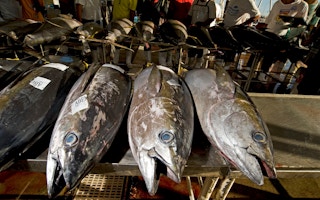Southeast Asia’s canneries have improved in their sourcing of traceable and sustainably fished tuna, but need to urgently eliminate forced labour at sea, said environmental advocacy group Greenpeace, which has called for verifiable time-bound commitments from the industry.
To continue reading, subscribe to Eco‑Business.
There's something for everyone. We offer a range of subscription plans.
- Access our stories and receive our Insights Weekly newsletter with the free EB Member plan.
- Unlock unlimited access to our content and archive with EB Circle.
- Publish your content with EB Premium.
Incidents of labour abuse remain “intolerably high”, Greenpeace Southeast Asia said in the fourth edition of its tuna cannery ranking released on Tuesday (25 August). It cited documented incidents from its report in December last year about modern slavery among migrant fishers in the region, as well as studies by other organisations such as Praxis Labs.
Conditions faced by migrant fishers include deception in the recruitment process, withholding of wages, excessive overtime and physical and sexual abuse.
Of the 20 tuna canneries—nine from Thailand, five from Indonesia and six from the Philippines—ranked, nearly half (nine) have not established measures for early detection and prevention of modern slavery at sea.
Only eight companies refuse to source tuna from vessels that collect deposits from crew members to guarantee they would serve out the length of their contracts. Only seven of them require a list of the migrant fishers on board a vessel.
And only four companies have whistle-blower and anonymous hotlines or email addresses for migrant fishers to file complaints.
“Companies must perform due diligence on human rights and sustainability beyond what is necessary in other sectors, especially as tuna fishing remains an exceptionally high-risk industry,” said Ephraim Batungbacal, regional oceans research coordinator at Greenpeace Southeast Asia.
Companies should create enabling conditions for fishers to form and lead their own labour unions, he said.
“
Companies must perform due diligence on human rights and sustainability beyond what is necessary in other sectors, especially as tuna fishing remains an exceptionally high-risk industry.
Ephraim Batungbacal, regional oceans research coordinator, Greenpeace Southeast Asia
Criteria used in the ranking included sustainability, legality, sourcing policy, traceability, whether the companies were driving change, transparency and customer information, and equity. Examples of questions asked of the canneries were:
- Whether the tuna came from healthy stocks that are not overfished;
- Whether the tuna were caught using fishing methods that avoided sharks, baby tuna and other bycatch;
- Whether the cannery takes proactive measures to verify that it is not sourcing from vessels or companies that have been involved in illegal, unreported or unregulated fishing;
- Whether it promotes the ratification of the International Labour Organisation’s Work in Fishing Convention.
Companies with the best overall scores were Indonesia’s PT Citaraja Ampat Canning, Thailand’s Super C Chef, the Philippines’ Alliance Select Foods International and Indonesia’s PT Samudra Mandiri Sentosa.
Fifteen companies such as Pataya Foods’ Nautilus brand (Thailand), General Tuna Corporation (Philippines) and Thai Union’s Ayam brand had scores that were considered “fair”. The only company with a “poor” score was Hi-Q Food Products’ Roza brand of Thailand.
When it came to legality and labour concerns in particular, only one company—Alliance Select Foods International, which offers the Bay of Gold brand—earned a “good” score while the others’ performance were deemed “fair” or “poor”.
As for traceability, 15 of the 20 companies earned “good” scores, compared to 12 of the 23 companies assessed in the previous edition released in December 2018.
To achieve a more sustainable and socially just fishing industry, Greenpeace Southeast Asia urged companies to source from fishing gears such as pole and line, or purse seining vessels that do not use fish aggregating devices. Such methods are less indiscriminate and avoid catching other marine life.
Companies should adhere to the UN Guiding Principles on Business and Human Rights, it said. They should phase out a practice called at-sea transshipment, where cargo, humans and supplies are transferred at sea instead of at a port, increasing the risk of unlawful activities such as human trafficking and illegal fishing. Companies should also consider sourcing from suppliers and vessels that spend a maximum of three months at sea, Greenpeace said.
Tuna is one of the most economically valuable fish, the report noted. Total production in 2018 amounted to 6.84 million metric tonnes, according to the United Nations’ Food and Agriculture Organisation. The total export value of fresh, frozen, chilled and processed tuna was US$12.4 billion, of which canned tuna products was worth US$7.8 billion.
Thailand was Southeast Asia’s top tuna exporting country as of 2018, while Indonesia, the Philippines and Vietnam were also among the top exporters of processed canned tuna. The four countries made up 42 per cent of all canned tuna exports in 2018, Greenpeace noted.
The biggest processed canned tuna importers were the United States, Italy, Spain, France and the United Kingdom. Tuna from Southeast Asia that has been responsibly sourced continues to be more accessible to customers in North America and Europe, the report noted.










